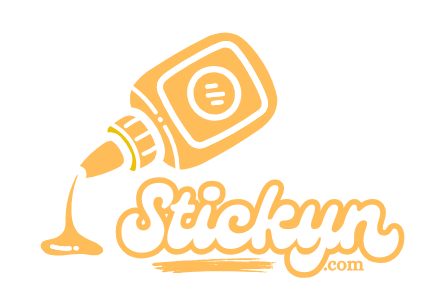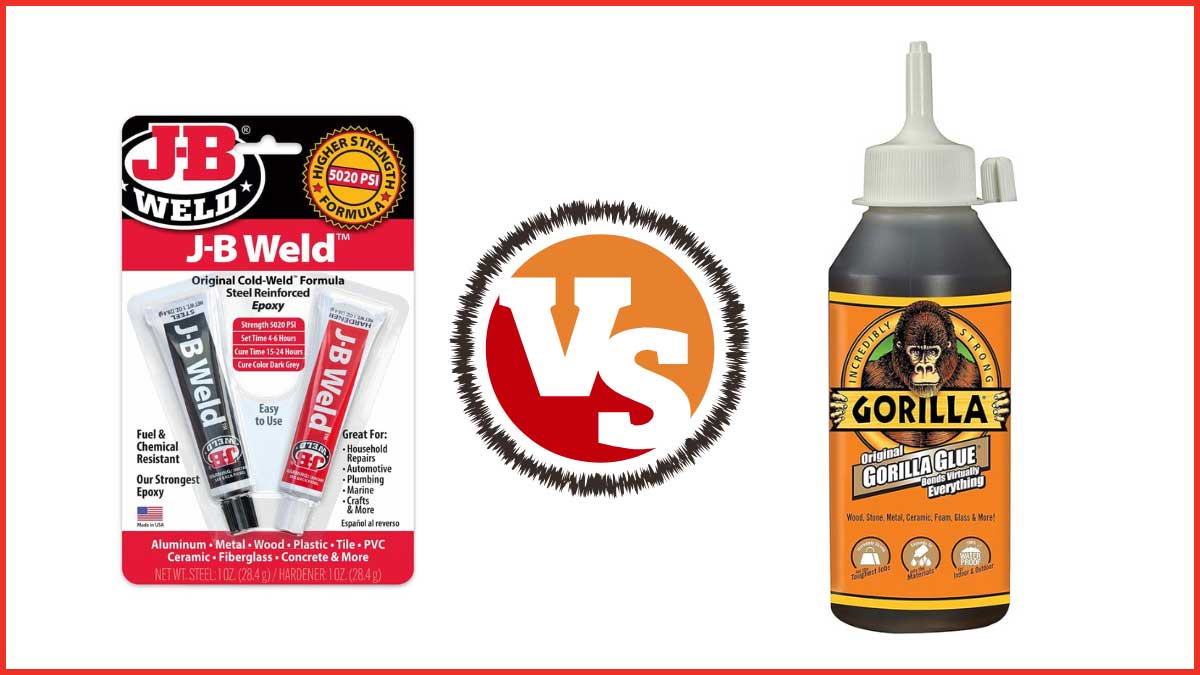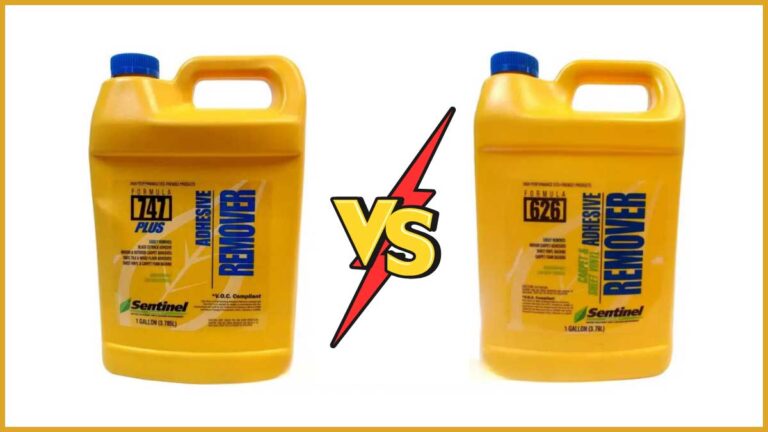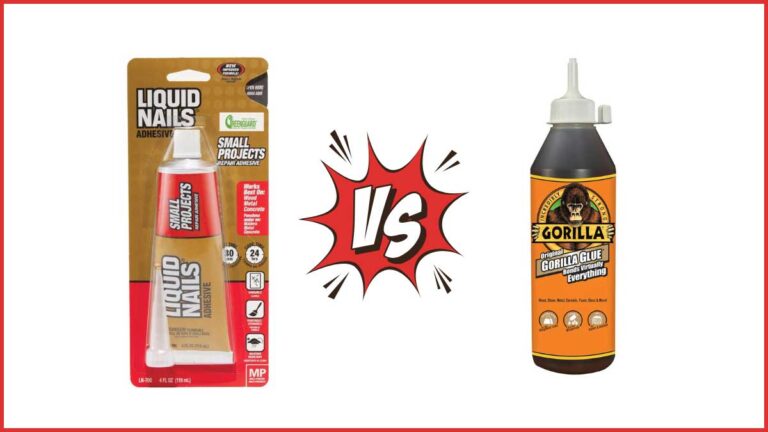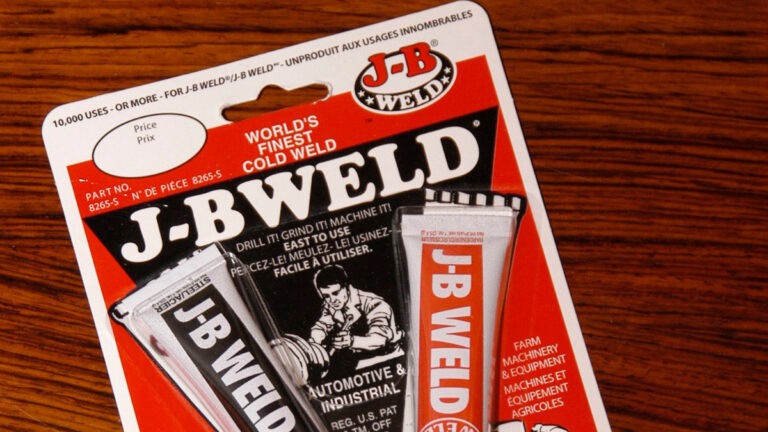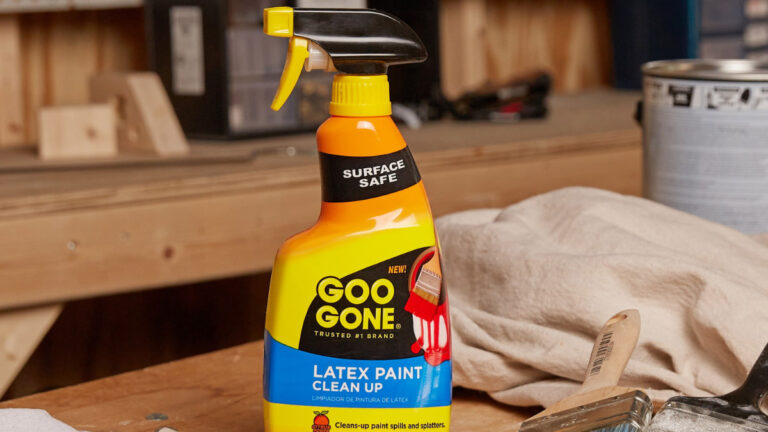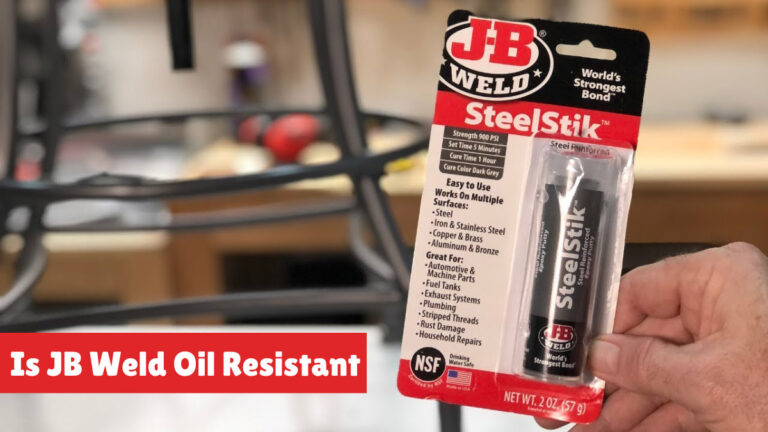JB Weld vs Gorilla Glue: Which Adhesive Is Best for Your Project?
When it comes to fixing broken items or tackling DIY projects, choosing the right adhesive can make all the difference. Two popular options you’ll often come across are JB Weld and Gorilla Glue. Both have their unique strengths, but which one is best suited for your needs?
In this text, we’ll jump into the key differences between JB Weld and Gorilla Glue, helping you make an well-informed choice. Whether you’re repairing metal, wood, plastic, or ceramics, understanding these adhesives’ properties will ensure your project stands the test of time.
Key Takeaways
- JB Weld and Gorilla Glue Composition: JB Weld is a two-part epoxy adhesive containing metallic fillers for enhanced strength and heat resistance. Gorilla Glue is a polyurethane adhesive that expands as it cures, activated by moisture.
- Application Methods: JB Weld requires mixing resin and hardener before use, ideal for metal and high-strength repairs. Gorilla Glue is applied directly from the bottle, suitable for wood and porous materials.
- Bond Strength and Curing Time: JB Weld offers high tensile strength and is suitable for heavy-duty repairs with an initial set time of 4-6 hours and full curing in 15-24 hours. Gorilla Glue also provides a strong bond for various materials with an initial set time of 1-2 hours and full curing in 24 hours.
- Ideal Uses: JB Weld is best for metal bonding, high-temperature applications up to 500°F, and structural repairs. Gorilla Glue excels in wood projects, versatile material bonding, and waterproof applications.
- Pros and Cons: JB Weld is durable and heat-resistant but requires careful mixing and longer curing time. Gorilla Glue is easy to use and expands to fill gaps but can be messy and has lower heat resistance.
- Safety and Environmental Impact: Both adhesives are non-toxic once cured but should be handled carefully in well-ventilated areas during application to avoid inhaling fumes. Proper disposal of uncured substances is essential to minimize environmental harm.
Overview Of JB Weld And Gorilla Glue
Understanding the strengths and applications of JB Weld and Gorilla Glue helps you choose the right adhesive for your projects.
What Is JB Weld?
JB Weld is a two-part epoxy adhesive known for its high strength and versatility.
- Composition:
- Contains metallic fillers
- Enhances strength and heat resistance
- Applications:
- Effective for bonding metal, plastic, and PVC
- Used in automotive and industrial settings
- Adheres to wood, concrete, and ceramic tile
- Heat Resistance:
- Handles moderate heat (up to 500°F)
- Usage:
- Requires mixing two components
- Provides a strong, durable bond
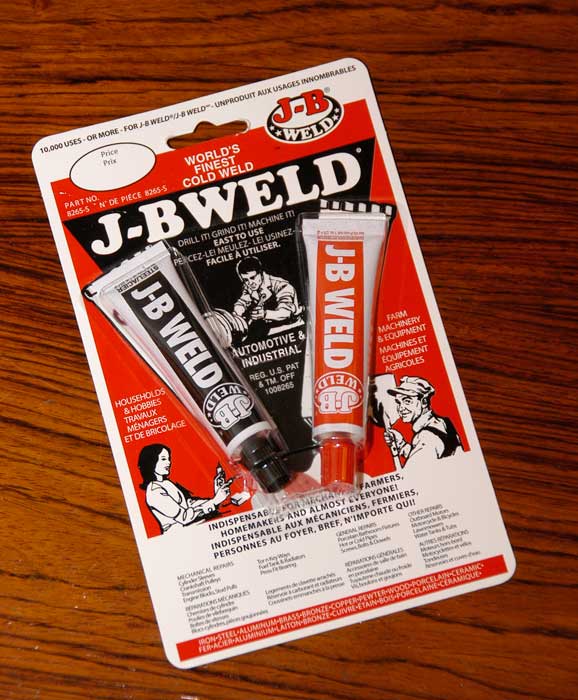
What Is Gorilla Glue?
Gorilla Glue is a polyurethane adhesive renowned for its versatility and strong bonding capabilities.
- Composition:
- Polyurethane-based
- Expands as it cures
- Applications:
- Bonds wood, stone, metal, ceramic, foam, glass, and more
- Suitable for indoor and outdoor use
- Water Resistance:
- Waterproof once cured
- Ideal for exterior projects
- Usage:
- Requires moisture to activate
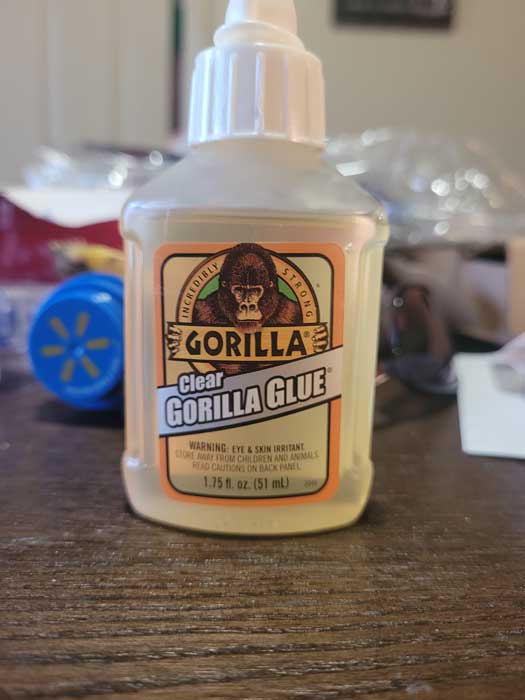
Key Differences Between JB Weld And Gorilla Glue
Understanding the key differences between JB Weld and Gorilla Glue can guide you in choosing the right adhesive for your repair projects. These adhesives have unique properties making them suitable for different applications.
Composition
JB Weld
- Type: Two-part epoxy adhesive
- Components: Resin and hardener, including metallic fillers
- Properties: Enhanced strength and heat resistance
Gorilla Glue
- Type: Polyurethane adhesive
- Components: Primarily polyurethane
- Properties: Expands as it dries and requires moisture to cure
Application Methods
JB Weld
- Process: Requires mixing resin and hardener before application
- Usage: Ideal for metal, automotive repairs, and materials needing high strength
- Messiness: Can be messy, requiring careful handling
Gorilla Glue
- Process: Applied directly from the bottle, no mixing needed
- Usage: Best for wood, rubber, and porous materials
- Expansion: Expands as it dries, filling gaps
Bond Strength
JB Weld
- Strength: High tensile strength, ideal for heavy-duty repairs
- Materials: Bonds metal, plastic, PVC
- Industrial Use: Common in automotive and industrial settings
Gorilla Glue
- Strength: Strong for porous materials, versatile
- Materials: Bonds wood, stone, metal, glass
- Environment: Suitable for indoor and outdoor use
Curing Time
JB Weld
- Initial Set: Takes 4-6 hours
- Full Cure: Requires 15-24 hours
- Temperature: Handles moderate heat up to 500°F
Gorilla Glue
- Initial Set: Takes 1-2 hours
- Full Cure: Requires 24 hours
- Activation: Needs moisture to activate
Usage Summary
For metal or automotive repairs, JB Weld provides exceptional strength and heat resistance. But, it needs careful mixing and a longer curing time. Gorilla Glue excels for wood and porous materials, requiring less preparation time but expanding as it cures.
| Feature | JB Weld | Gorilla Glue |
|---|---|---|
| Type | Two-part epoxy adhesive | Polyurethane adhesive |
| Components | Resin and hardener, metallic fillers | Primarily polyurethane |
| Application Method | Requires mixing | Applied directly |
| Ideal Materials | Metal, plastic, PVC | Wood, stone, metal, glass |
| Initial Set Time | 4-6 hours | 1-2 hours |
| Full Cure Time | 15-24 hours | 24 hours |
| Activation | No additional requirements | Requires moisture |
| Heat Resistance | Up to 500°F | Moderate to high heat |
By considering these key differences, you’ll select the appropriate adhesive for your projects, ensuring durable and efficient repairs.
Ideal Uses For Each Product
Selecting the ideal adhesive for your project can make all the difference in the outcome and durability. JB Weld and Gorilla Glue excel in different scenarios, each bringing unique strengths to the table. Understanding these can help you make an informed choice.
Best Scenarios For JB Weld
- Metal Bonding:
- JB Weld is extraordinary for bonding metal surfaces.
- The epoxy contains metallic fillers, enhancing durability and heat resistance.
- Example: Repairing a broken engine part or a cracked metal pipe.
- High-Temperature Applications:
- JB Weld endures high temperatures up to 500°F (260°C).
- Suitable for automotive repairs and machinery.
- Example: Fixing a muffler or sealing a high-temperature joint.
- Structural Repairs:
- It offers a durable bond for structural repairs.
- Excellent for broken tools, machinery parts, and other metal components.
- Example: Mending a broken wrench or a metal frame.
- Non-Porous Surfaces:
- JB Weld works on non-porous surfaces like metal, plastic, and PVC.
- Makes it versatile for DIY and industrial applications.
- Example: Sealing a PVC pipe or repairing a plastic component.
Best Scenarios For Gorilla Glue
- Wood Bonding:
- Gorilla Glue is perfect for wood projects due to its strong adhesion and expansion.
- Works well for indoor and outdoor wooden furniture.
- Example: Assembling a wooden chair or fixing a broken table leg.
- Versatile Material Bonding:
- Bonds various materials including wood, stone, metal, and glass.
- Ideal for multi-surface projects.
- Example: Crafting a mixed-material sculpture or repairing ceramic items.
- Waterproof Needs:
- Gorilla Glue is waterproof once cured.
- Suitable for projects exposed to moisture.
- Example: Fixing an outdoor flower pot or a kitchen utensil.
- Quick Setting:
- Initial set time of 1-2 hours for fast projects.
- Excellent for quick fixes and time-sensitive repairs.
- Example: Emergency repairs or last-minute craft projects.
Overall, JB Weld is your go-to for high-strength metal and high-temperature applications, while Gorilla Glue offers versatility and robustness across various materials. Determine your project’s requirements to choose the most effective adhesive.
Summary
Achieving the best results for your repair or DIY project requires the right adhesive. For bonding metal, enduring high temperatures, and structural repairs, JB Weld stands out. For wood, versatile material bonding, and waterproof applications, Gorilla Glue shines. Each adhesive has its niche, ensuring you can tackle any project with confidence and precision. Make informed decisions based on your specific needs to ensure lasting and quality results.
Pros And Cons
Understanding the pros and cons of JB Weld and Gorilla Glue can help you make an well-informed choice for your repair needs. Let’s break down the advantages and limitations of each adhesive to determine their optimal use cases.
Pros Of JB Weld
- Metallic Filler: JB Weld’s metallic filler enhances its strength and heat resistance, making it ideal for sanding and shaping after it hardens.
- High Heat Resistance: Withstanding temperatures up to 500°F, JB Weld is perfect for applications requiring extreme heat tolerance.
- Versatile Applications: This epoxy works on various materials, including metal, plastic, PVC, wood, concrete, and ceramic tile.
- Durability: It forms a robust bond capable of enduring substantial stress, suitable for heavy-duty repairs.
- Long Shelf Life: The two-part epoxy maintains its effectiveness longer than pre-mixed adhesives.
Cons Of JB Weld
- Messy Application: Mixing and applying JB Weld can be inconvenient and messy.
- Curing Time: Though it sets quickly, full curing takes 15-24 hours, which may not suit urgent repairs.
Pros Of Gorilla Glue
- Wide Material Compatibility: Gorilla Glue bonds a range of materials like wood, stone, metal, and glass, offering versatility.
- Waterproof: Once cured, it becomes waterproof, making it suitable for outdoor and moisture-prone repairs.
- Expansion During Cure: The adhesive expands as it cures, filling gaps and increasing the bond strength.
- Ease of Use: It can be applied directly from the bottle without extensive preparation.
Cons Of Gorilla Glue
- Foaming Action: The expanding foam can create excess mess and requires cleanup.
- Need For Moisture: Gorilla Glue needs moisture to activate, which can complicate its application on dry surfaces.
- Lower Heat Resistance: It doesn’t withstand high temperatures as well as JB Weld, limiting its use in heat-exposed environments.
| Feature | JB Weld | Gorilla Glue |
|---|---|---|
| Strength | High, thanks to metallic filler | High, due to expansion |
| Heat Resistance | Up to 500°F | Lower, not suited for high heat |
| Versatility | Metal, plastic, wood, etc. | Wood, stone, metal, glass |
| Durability | Excellent for heavy-duty repairs | Strong bond |
| Shelf Life | Long | Moderate |
| Ease of Use | Requires mixing | Apply directly from bottle |
| Waterproof | Yes | Yes |
| Application Messiness | High | Moderate |
| Curing Time | 15-24 hours | 1-2 hours |
Summarizing these strengths and weaknesses helps ensure you select the adhesive best suited to your project needs. For metal and high-temperature repairs, JB Weld is an excellent choice. Gorilla Glue works well for versatile, quick fixes with strong waterproof bonds.
Safety And Environmental Impact
Chemical Composition And Safety
JB Weld: JB Weld consists of two-part epoxy adhesive with metallic fillers. These fillers enhance the strength and heat resistance of the product. Once mixed and applied correctly, JB Weld doesn’t emit strong fumes. But, mixing can be messy. Ensure you follow the instructions and use JB Weld in a well-ventilated area to avoid inhaling any potential fumes during the mixing and application process.
Gorilla Glue: Gorilla Glue, especially the polyurethane-based versions, can emit strong fumes and foam during curing. This poses a concern if you’re sensitive to chemical fumes. Use Gorilla Glue in a well-ventilated area to minimize inhalation risks.
Environmental Impact
JB Weld: Once cured, JB Weld is generally non-toxic. But, the uncured components can be hazardous. It’s crucial to handle and dispose of uncured JB Weld properly to avoid environmental harm.
Gorilla Glue: Gorilla Glue behaves similarly in terms of toxicity. Once it’s cured, it’s non-toxic. Careful handling and disposal of uncured components are necessary to minimize environmental impact.
Key Properties Comparison
| Property | JB Weld | Gorilla Glue |
|---|---|---|
| Components | Two-part epoxy with metallic fillers | Polyurethane adhesive |
| Fume Emission During Mixing | Low | High |
| Fume Emission During Curing | Minimal | High |
| Handling Precaution | Use in well-ventilated area | Use in well-ventilated area |
| Toxicity Post-Curing | Non-toxic | Non-toxic |
| Environmental Concerns | Handle uncured components properly | Handle uncured components carefully |
Key Terms
Epoxy Adhesive: A type of adhesive that involves a chemical reaction between two components, resulting in a strong, durable bond.
Polyurethane Adhesive: A versatile adhesive known for expanding while curing, useful for bonding diverse materials.
Fume Emission: The release of gases or vapors during the chemical reaction process of adhesives.
Non-toxic: Safe for humans and the environment once fully cured, with no harmful emissions.
- Ventilation: Always use both products in well-ventilated areas.
- Protective Gear: Wear gloves and masks to avoid direct contact with the adhesive and inhalation of fumes.
- Instructions: Follow the manufacturer’s guidelines carefully for mixing and application.
- Disposal: Dispose of any uncured adhesive materials according to local regulations to minimize environmental harm.
By understanding JB Weld and Gorilla Glue’s safety profiles and environmental impacts, you can choose the best adhesive for your project while ensuring a safe working environment.
Conclusion
Choosing between JB Weld and Gorilla Glue depends on your specific project needs. JB Weld excels in heavy-duty repairs, especially with metal and high-temperature applications. Its strength and durability make it a reliable choice for automotive and industrial settings.
Gorilla Glue, with its wide material compatibility and ease of use, is perfect for versatile repairs and DIY projects. Its waterproof properties and quick initial set time make it convenient for both indoor and outdoor tasks.
By understanding the unique strengths and limitations of each adhesive, you can confidently select the right one for your needs, ensuring a successful and durable repair.
Frequently Asked Questions
What is the main difference between JB Weld and Gorilla Glue?
JB Weld is a two-part epoxy known for its high strength and heat resistance, ideal for metal and heavy-duty repairs. Gorilla Glue is a polyurethane adhesive that works well on various materials and is waterproof, expanding as it cures.
Which adhesive is better for metal repairs?
JB Weld is better for metal repairs due to its high tensile strength, heat resistance, and durable bond, making it suitable for automotive and industrial applications.
Can Gorilla Glue be used on outdoor projects?
Yes, Gorilla Glue is waterproof and suitable for both indoor and outdoor use. It bonds well with wood, stone, metal, and more.
How long does JB Weld take to cure?
JB Weld takes about 15-24 hours to fully cure, though it sets in 4-6 hours. This longer curing time allows for a very strong and durable bond.
Is there any special preparation needed for using Gorilla Glue?
Gorilla Glue requires moisture to activate. It’s essential to dampen the surfaces before applying the glue to ensure it cures properly and creates a strong bond.
Can I use JB Weld on plastic?
Yes, JB Weld is versatile and effective for bonding various materials, including metal, plastic, and PVC.
Does Gorilla Glue expand as it cures?
Yes, Gorilla Glue expands as it cures. This helps create a stronger bond but can also lead to a mess if not applied carefully.
Which adhesive has better heat resistance?
JB Weld has better heat resistance and can handle temperatures up to 500°F, making it suitable for high-temperature applications.
Are there any safety concerns when using JB Weld or Gorilla Glue?
Both adhesives should be used in well-ventilated areas. JB Weld components can be hazardous if uncured, while Gorilla Glue emits strong fumes during curing. Always handle with care and dispose of materials properly.
